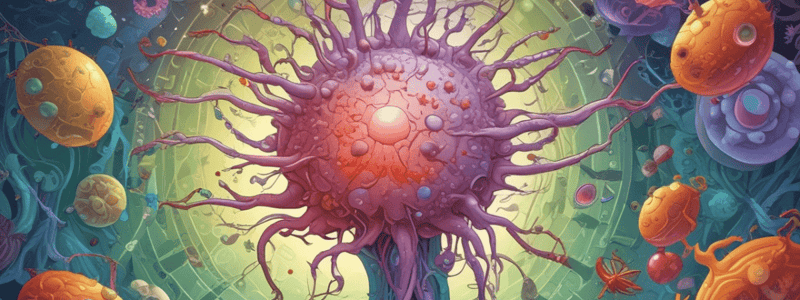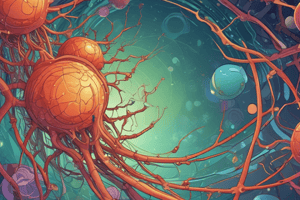Podcast
Questions and Answers
What is the primary function of the immune system?
What is the primary function of the immune system?
- To recognize and eliminate foreign cells (correct)
- To promote the growth of foreign cells
- To create a symbiotic relationship with other organisms
- To adapt to environmental changes
What is the main characteristic of the innate immune system?
What is the main characteristic of the innate immune system?
- It is only present in certain individuals
- It is non-specific and recognizes anything that is not self (correct)
- It is specific to certain types of infections
- It is acquired through exposure to infections
How does the adaptive immune system respond to infections?
How does the adaptive immune system respond to infections?
- It remains unchanged and only responds to severe infections
- It only responds to viral infections
- It produces a general response to all infections
- It changes in character to fight specific infections (correct)
What is produced by the adaptive immune system to fight specific infections?
What is produced by the adaptive immune system to fight specific infections?
What is the main difference between the innate and adaptive immune systems?
What is the main difference between the innate and adaptive immune systems?
What would happen if foreign organisms were allowed to spread unchecked in the body?
What would happen if foreign organisms were allowed to spread unchecked in the body?
What is a key feature of the innate immune system?
What is a key feature of the innate immune system?
What happens to the adaptive immune system following an infection?
What happens to the adaptive immune system following an infection?
What is the relationship between the adaptive immune system and foreign cells?
What is the relationship between the adaptive immune system and foreign cells?
What is a key difference between the innate and adaptive immune systems?
What is a key difference between the innate and adaptive immune systems?
Flashcards are hidden until you start studying
Study Notes
Immunology and the Immune System
- Immunology is the study of the immune system that protects us from foreign organisms and agents.
- The immune system has three main functions: recognising, eliminating, and destroying foreign cells, as well as remembering them.
Components of the Immune System
- The immune system consists of two main components: the innate immune system and the adaptive immune system.
Innate Immune System
- The innate immune system is present from birth and is non-specific, meaning it recognises anything that is "not self".
- It provides immediate defense against infections and is the first line of defense.
Adaptive Immune System
- The adaptive immune system changes in character following an infection to make it more capable of fighting the infection.
- It is specific, meaning a specific cell or agent of the immune system (e.g. an antibody) is produced to fight a specific invasion.
- The adaptive immune system allows for long-term immunity to specific pathogens.
Immunology and the Immune System
- Immunology is the study of the immune system that protects us from foreign organisms and agents.
- The immune system has three main functions: recognising, eliminating, and destroying foreign cells, as well as remembering them.
Components of the Immune System
- The immune system consists of two main components: the innate immune system and the adaptive immune system.
Innate Immune System
- The innate immune system is present from birth and is non-specific, meaning it recognises anything that is "not self".
- It provides immediate defense against infections and is the first line of defense.
Adaptive Immune System
- The adaptive immune system changes in character following an infection to make it more capable of fighting the infection.
- It is specific, meaning a specific cell or agent of the immune system (e.g. an antibody) is produced to fight a specific invasion.
- The adaptive immune system allows for long-term immunity to specific pathogens.
Studying That Suits You
Use AI to generate personalized quizzes and flashcards to suit your learning preferences.




